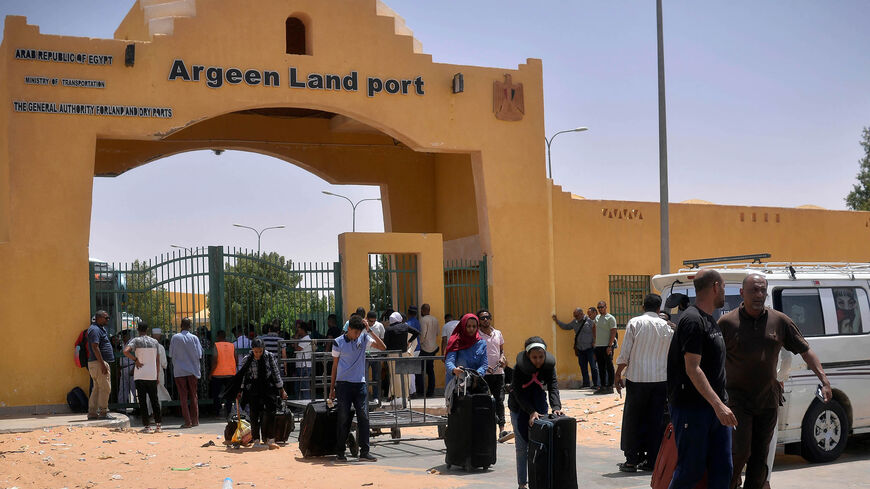The outbreak of clashes between the Sudanese army and the Rapid Support Forces paramilitary group came as bad news for Egypt’s economy, already struggling under severe pressure over the past year.
Egypt fears that a prolonged conflict across the border in Sudan, a major market for its exports, will complicate its economic hardships.
Egypt’s trade exchange with Sudan hit $1.4 billion in 2022, up from $1.2 billion a year earlier, including $929.2 million in Egyptian exports and $504.4 million in imports, according to the state-run Central Agency for Public Mobilization and Statistics.
Sudan also came as the second-largest market for Egyptian exports after Libya in the first quarter of 2023 with $226 million, as shown by figures released last month by Egypt’s Ministry of Industry.
Sherif el-Gabali, head of the Egyptian-Sudanese Business Council, told Al-Monitor over the phone that it is still early to assess the impact of the conflict on the Egypt-Sudan trade exchange. He expects that many Egyptian companies will halt their exports to Sudan for fear of failing to collect their money, in addition to the high security risks resulting from the ongoing fighting there.
“The conflict in Sudan will surely lead to a decline in the volume of Egyptian exports to the Sudanese market,” he said. “Most Sudanese importers used to come with cash in hand to pay for Egyptian exports and transport them to the Sudanese market through the border. But the outbreak of violence in Sudan will make this very difficult to happen.”
"[The current conflict in Sudan] will also disrupt joint economic projects on which Egypt pinned hopes to boost its economic cooperation with Khartoum,” he added.
Egypt, which has emerged as a regional energy power in recent years, has an electric interconnection line with Sudan with a capacity of 80 megawatts (MW), and the two countries were planning to increase its capacity to 300 MW. Both Cairo and Khartoum were also planning to build a 570-kilometer (354-mile) railway to facilitate the movement of goods between the two countries.
Joint investments are also expected to be affected by the ongoing conflict in Sudan. There are nearly 229 Egyptian projects being implemented in Sudan, with up to $10.8 billion in investments, according to Egypt’s State Information Service (SIS). Nearly 315 Sudanese companies also operate in the Egyptian market, with some $97 million in investments, according to SIS.
Egypt has developed strong relations with the Sudanese army following the overthrow of long-serving President Omar al-Bashir in 2019. The two countries joined hands in pressing Ethiopia to reach a binding agreement on the filling and operation of the Grand Ethiopian Renaissance Dam, which Cairo views as an existential threat to its water share from the Nile River.
However, Egypt has largely avoided taking sides during the Sudanese conflict, only appealing to both military rivals to reach a permanent cease-fire to resolve their dispute.
Egypt fears that a prolonged conflict in Sudan will trigger an outflow of refugees from Sudan into the country, which will put further strain on its already fragile economy.
According to the UNHCR, the United Nations refugee agency, at least 56,000 Sudanese refugees have crossed into Egypt since the outbreak of violence last month.
Egypt already hosts around 9 million refugees, including nearly 4 million Sudanese, the International Organization for Migration estimates.
In an interview with Japanese newspaper Asahi Shimbun last week, Egyptian President Abdel Fattah al-Sisi warned that the flow of Sudanese refugees will create economic troubles for Egypt.
“Amid the economic difficulties stemming from the Russian invasion of Ukraine, many Sudanese have fled. So Egypt is also facing problems,” Sisi said. “We are already experiencing high inflation and the prices of daily necessities are surging.”
“If we were to accept even more Sudanese, Egypt will definitely feel the effects,” the Egyptian leader added.
Egypt is already facing multiple economic difficulties, including a shortage in foreign currency and surging inflation. The local currency has lost around 100% of its value since March 2022, trading at nearly 31 Egyptian pounds to the US dollar, causing inflation to soar. Egypt's annual core inflation peaked in February at 40.3%, before inching down to 39.5% in March. The annual headline inflation rate also surged to 33.9% in March this year, up from 12.1% in March 2022.
On May 5, credit ratings agency Fitch downgraded Egypt’s rating by one notch from B+ to B and attached a negative outlook due to the country’s economic hardships. “The external financing risk has increased given high external financing requirements, constrained external financing conditions and the sensitivity of Egypt’s broader financing plan to investor sentiment,” the agency said.
Last week, the global rating agency Moody’s warned that a prolonged conflict in Sudan could pose a credit-negative risk to neighboring countries, including Egypt.
Moody’s said that a probable spillover of the Sudanese conflict to neighboring countries would trigger broader asset-quality concerns for multilateral development banks with a higher concentration of loans in Egypt, Chad, South Sudan and Ethiopia.
Medhat Nafie, economic expert and adviser to the Egyptian supply minister, believes that the Sudanese conflict would disrupt the flow of investments into Egypt.
“The outbreak of any regional conflict would affect the ability of the whole region to attract investments, not to mention Egypt as a gateway to investment in sub-Saharan Africa,” Nafie told Al-Monitor.
He said the influx of refugees from Sudan into Egypt “will add further burdens on Egypt’s state budget and the labor market in the country.”








